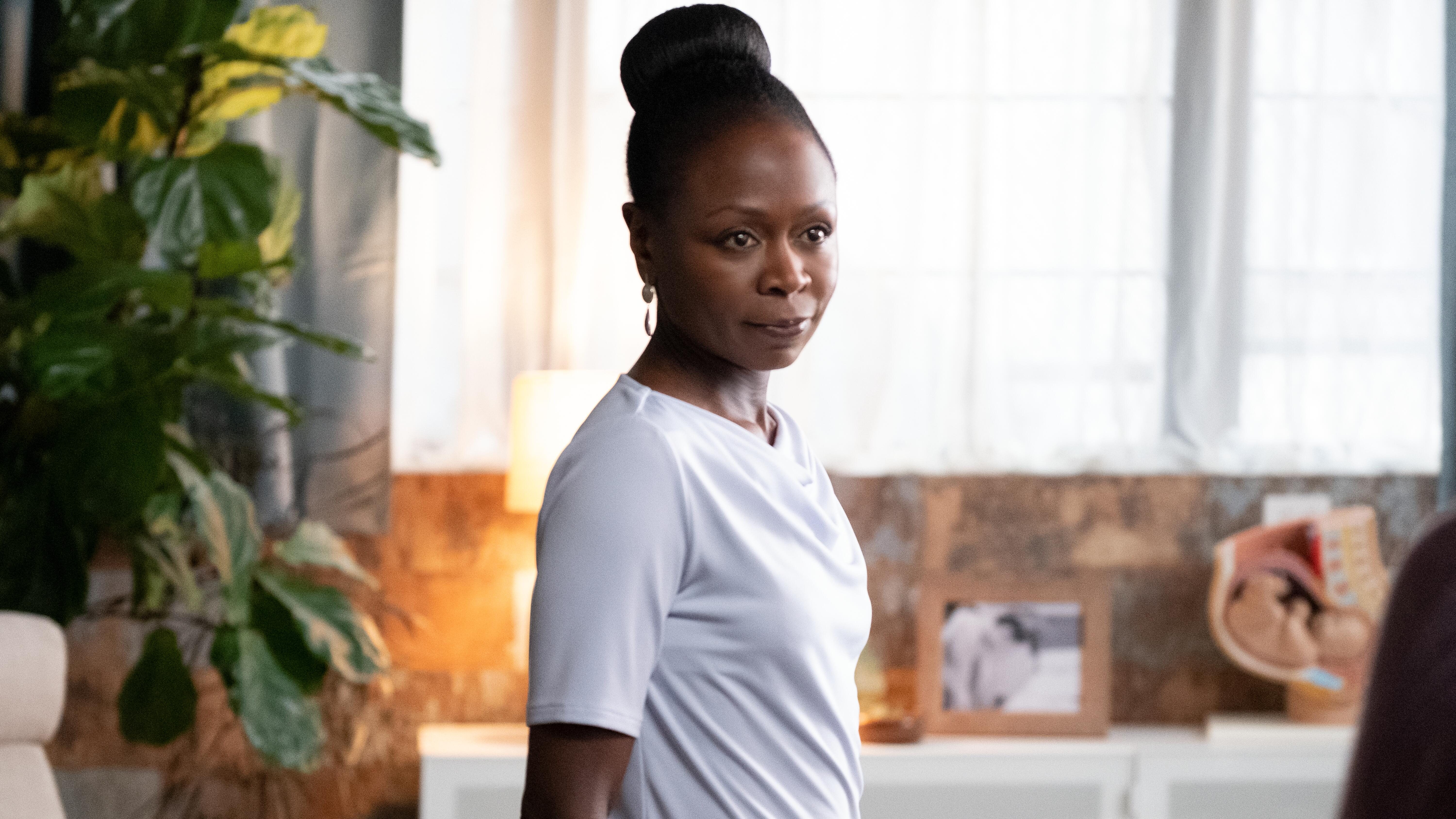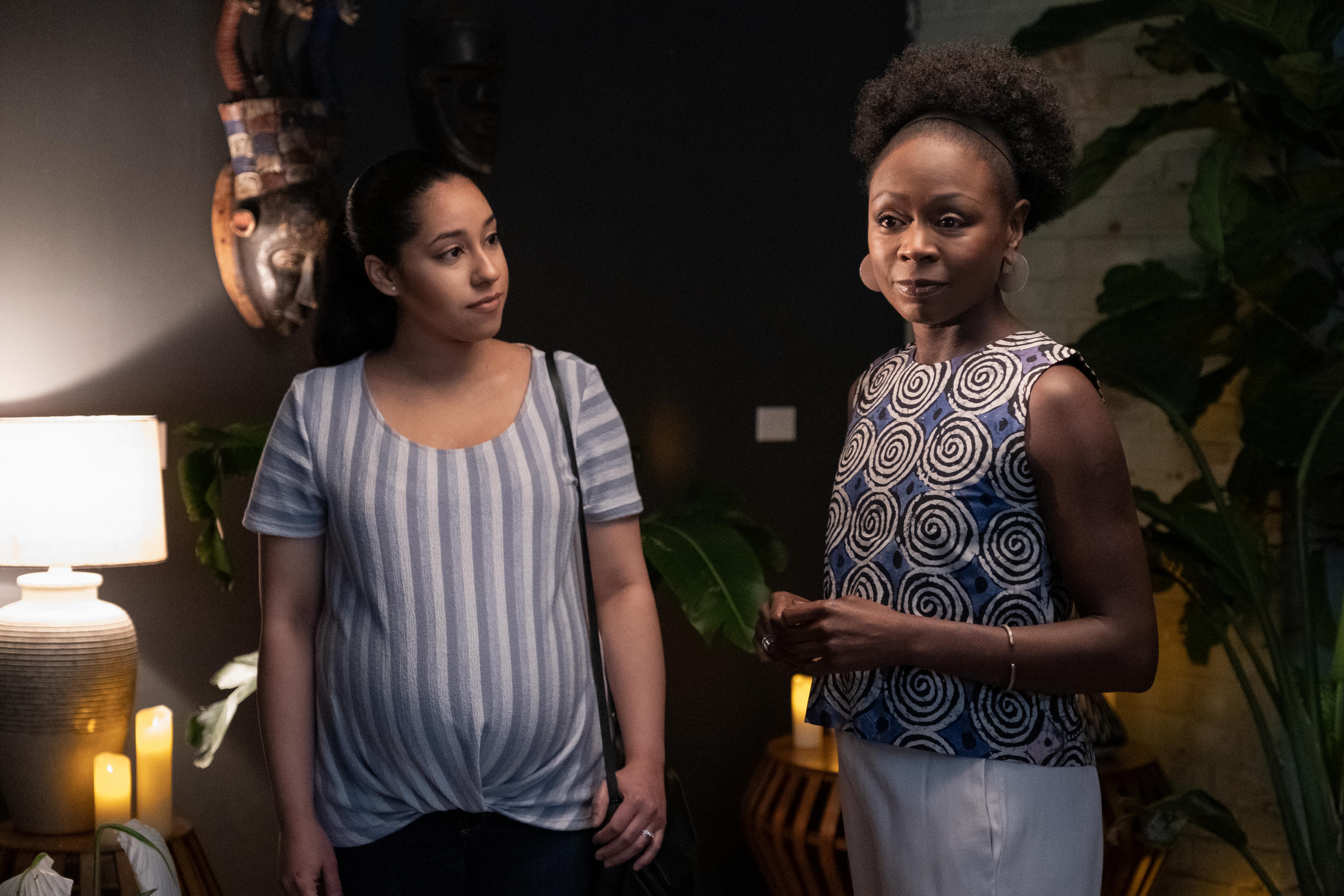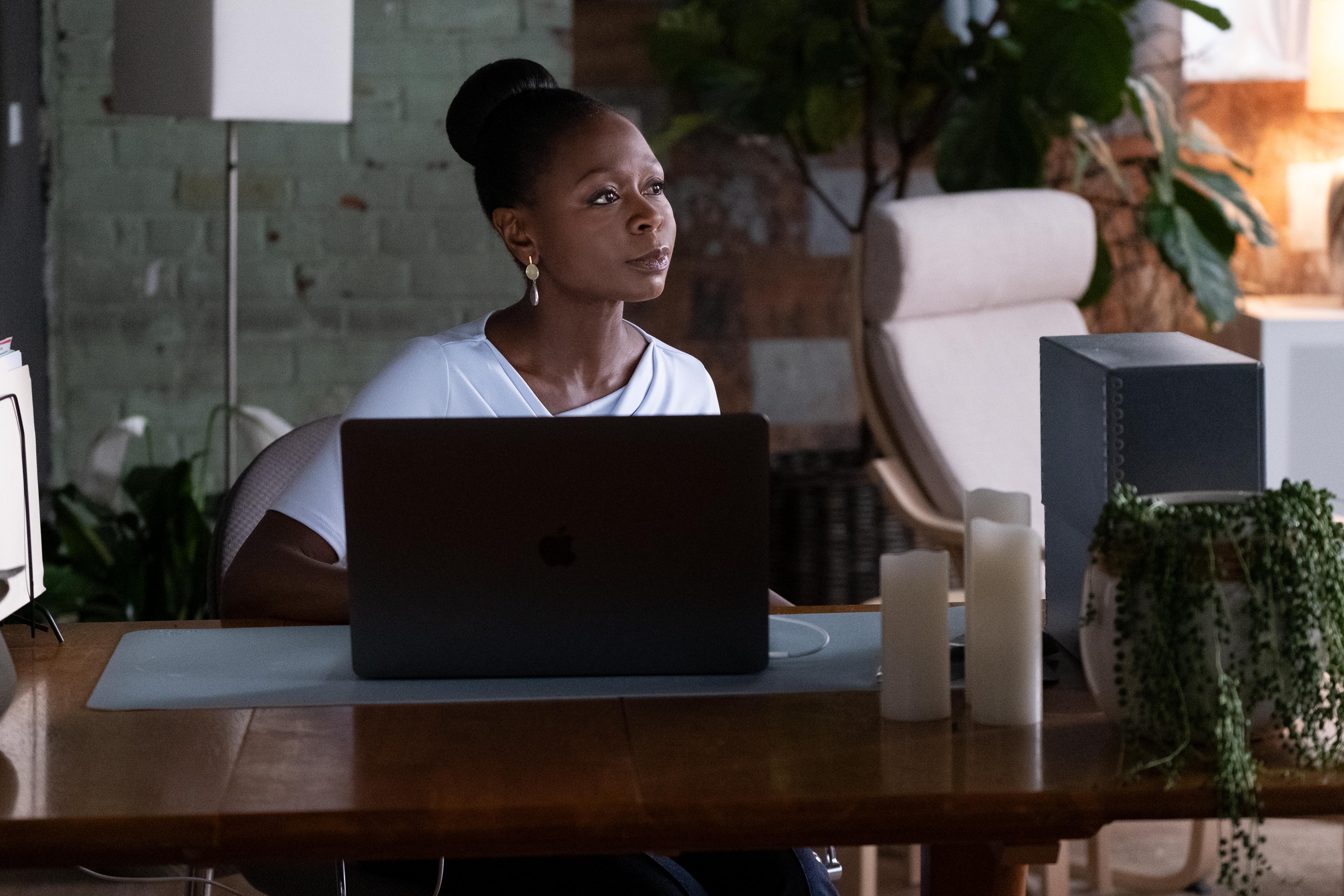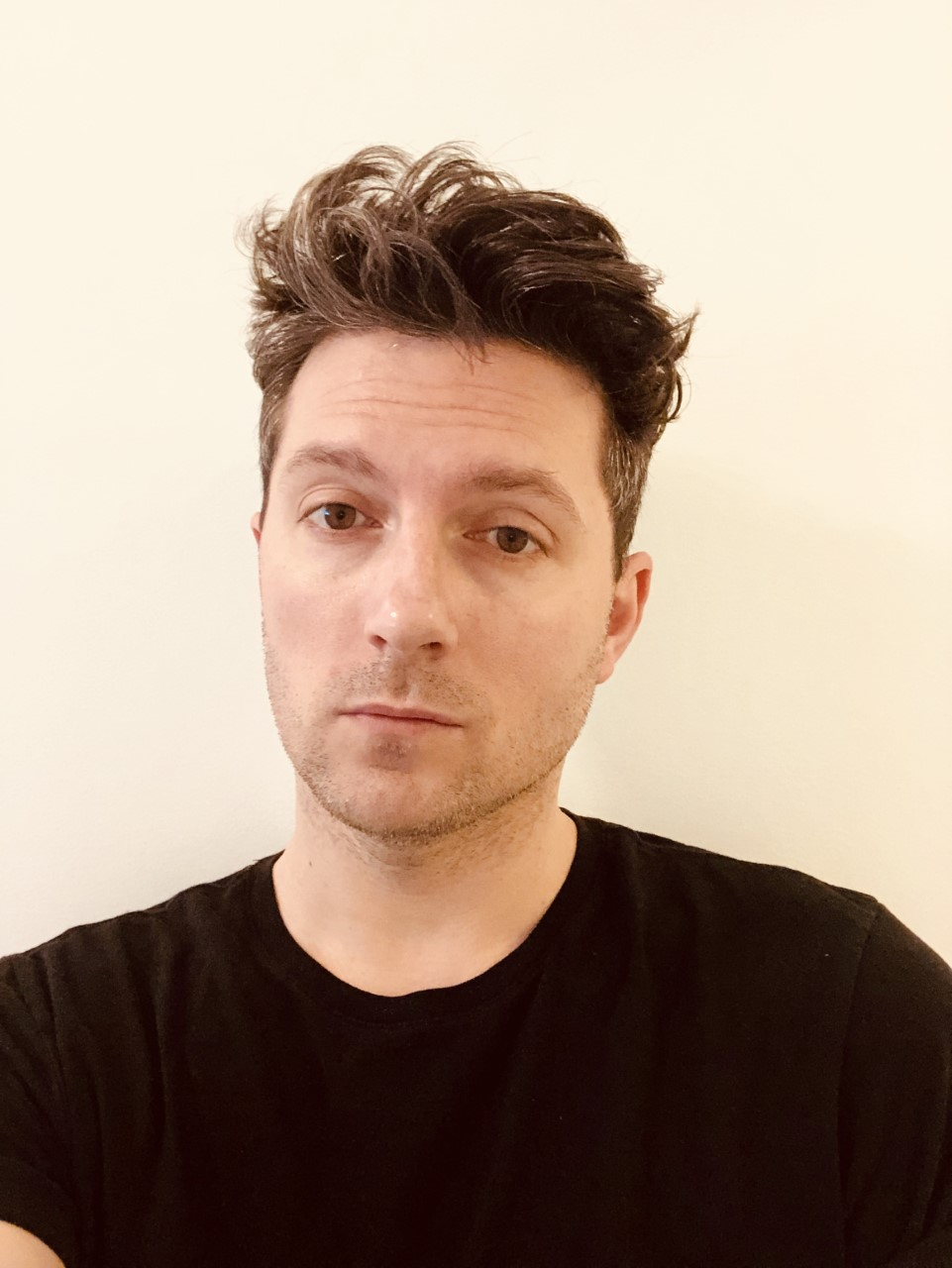

Spoiler alert: If you haven’t seen False Positive yet, you’re probably better off doing so before you read this interview. Because the truth is, it’s kind of pointless to talk to Zainab Jah about her character without revealing a pretty significant plot twist. The wry horror-satire is the latest in a long tradition of films that explore our collective anxieties about pregnancy and birth. In a 21st century twist on Rosemary’s Baby, Ilana Glazer plays Lucy, a successful Manhattan woman who is trying to get pregnant. After she and her husband Adrian (Justin Theroux) finally manage to conceive with the help of a renowned specialist (Pierce Brosnan), she begins to suspect something sinister is going on.
Lucy’s paranoia leads her to seek out a more “natural” approach to childbirth. She becomes fixated on Jah’s character, Grace, a doula who Lucy sees as more spiritual, more connected to the earth, more…exotic. If you’re starting to get uncomfortable with that description of a Black woman, that’s the point. It turns out—and here comes the spoiler—that version of Grace is all in Lucy’s head. The film presents us with a stereotypical “magical negro” before puncturing the trope by showing us the real Grace, without Lucy’s projections and expectations.
Recently, GRAZIA got a on the phone with Jah to talk about her character, how white women see Black women, and what the audience’s reaction to Grace says about them.
False Positive is the latest in the pregnancy horror subgenre. Why do you think pregnancy is so rich in potential for horror stories?
Wow, I’ve never really thought about that. I think the whole idea of pregnancy and birth, I think, essentially for us as humans is still so mysterious, you know? The whole thing that happens to a woman’s body and the mystery of nature and biology. Even though we have science that tells us what happens, still, there’s something very mystical and mysterious about it. I think that’s probably why it’s so rich for horror stories as well as fantasy stories. It’s just the mystery of birth, I think. It’s so magical.
I wonder if there’s an element of misogyny in creating horror stories around pregnancy. Not so much in this film—though I think it’s in conversation with that idea.
I mean, there’s certainly a lot of misogyny in the world of obstetrics, especially within the movie. We allude to the fact that most fertility doctors happen to be male, which is so strange. It’s very patriarchal and male dominated. But as someone who’s never given birth, I’ve never really thought about it in terms of the misogynistic nature of those films. Certainly, the way the guys are portrayed in those films—especially in Rosemary’s Baby—there’s definitely a huge underpinning of misogyny in that film. Not only from her husband, but from the male figures in her life, and it’s kind of similar to False Positive as well.
What kind of anxieties about pregnancy and reproduction do you think the film is highlighting? I’m thinking of the term “mommy brain” that comes up a lot in the film.
Yeah. I think the anxiety specifically in this film is that it’s something she’s really, really wanted. She really wants this thing so badly that she’s blinded to everything else around her. She’s just so focused on this one thing, and there’s certainly anxiety attached to that in terms of wanting this one thing and hoping you’ll be good at this thing that you think your life cannot go on without it. Certainly, I have friends who have been through that situation where they’re trying to have a child and the whole thing of a clock ticking for a woman’s body. That brings its own level of societal anxiety. And then the reality of it too, when that baby does come: Can you do this? Are you having buyer’s remorse? I often wonder when I see friends who’ve just had a child and they look so exhausted, I just think, Hmm. Are you experiencing any sort of buyer’s remorse?

John Lee and Ilana Glazer wrote the film together. I’m curious what kinds of discussions you had with them about Grace?
Interesting conversations… I loved the fact that it was a very collaborative process. They were very open to listening to ideas. Ilana reached out to me before we even started shooting. We actually went on lunch dates a couple of times, so we developed a real relationship as women. That certainly opened the door for me to feel that I could contribute to how I see the character. Specifically in terms of her wardrobe, what she wore. That was very important to me in that they were very specific about how she was dressed. So, it’s a fine line between what is real and what is not, certainly from Lucy’s point of view. There’s always the danger of going too far on the side of being so stereotypical to the point where not only will it make Lucy look delusional, but it was also make the filmmakers look delusional. Like, is this Lucy’s point of view or is this actually your real-life point of view? As an African woman myself, I have very strong ideas, grounded in my culture, about how someone like that would dress. So, it’s not looking like what Hollywood thinks that kind of person would do or wear. You’re not going to be putting her in big muumuus—at which point you might as well give me an African drum to beat!
What did you think of Grace the first time you encountered her on the page?
My first take of her was, Wow, she’s really grounded. She sounds very grounded and down-to-earth and straight talking and straight forward. Certainly, that’s not what’s projected onto her by the people around her. But from her point of view, she’s just the most grounded thing in Ilana’s character’s world. Of course, that’s not how she’s being seen; people are projecting all sorts of things onto her. I loved that about her. I mean, at first when I read it, I kind of balked at the idea of playing, I sort of felt, more like a nurse. And as a Black actor, I’m always getting asked to play nurses. I’m like, Ugh, no. I’m tired of this! I don’t want to play a nurse! But then, when I saw that she’s not a nurse, she’s a doula and the things that she says and what she stands for and how people see her made her so interesting to me. I thought, Ok, I might break my rule here and play this character because I really am fascinated by her.
So, the first time you read the script, did you know there was going to be that twist where we find out that she’s not the person that Lucy is seeing? Or were you reading it thinking, Oh boy, this is a stereotype.
Yeah. Basically, I was reading it thinking, Oh God. But then when it got to that point I thought, Oh, ok… Specifically, a particular line that she says in the film that sealed the whole deal for me, where she says “I am not your mystical…” And I went, Ok. That one line encapsulates everything about Grace that I love. That is the line that made me say, “Yes, I will do this.”
It says a lot about Lucy too, for sure.
Absolutely. I mean, it’s so grounded in reality, in terms of how you’re seen and what people project onto you. I live in a neighborhood in Brooklyn where it’s populated by a world of Lucys. Sometimes, the reactions that I get from those women…I wouldn’t be remiss in saying exactly what Grace says in the film to them in real life. God help me if I see a beautiful baby in a stroller, suddenly I’m being asked if I want a job as a nanny! It’s very brave the way [Grace] was written, the honesty that went into that character. Because it is something that a lot of white women do project onto Black women.

I think the character reveals something about the people who see it as well. For me, watching it—and even just watching the trailer—I was a little uncomfortable. I was like, Are they really doing this in 2021? And I wonder if there will be people who see the film and don’t have that initial reaction of discomfort with the way Grace is portrayed at first.
Yeah, isn’t it interesting. It would be fascinating to see the reactions of people who don’t actually see that at the start. And it’s amazing that you say you were watching it thinking, Are they really doing this in 2021? And it’s like, it happens, still. I can’t tell you how many times I’ll be talking to, specifically, a white woman, and I have a British accent, and we’ll be in the middle of a conversation and then suddenly they’ll start saying, “You go girl!” I’m like, Why are you talking to me like that? I don’t speak like that! You can hear I’m not from that world. But they’re projecting this thing onto me because it’s what they believe, rightly or wrongly, you know they’ve decided, This is what I need you to be. I don’t care where you’re from or how you sound, this is what I’ve decided, in my mind, is who you are. Grace and Lucy’s conversation is very much like that. Lucy has projected this idea of who Grace is onto Grace and she doesn’t want to hear anything otherwise.
The monologue Grace gives also had me really confused about what the film was trying to say about science vs. this kind of Goop-y earth mother perspective. How much of that do you think is her actual philosophy and how much is Lucy’s projection?
I’m trying to remember what I said, but it’s probably to do with the fact that the world of childbirth is so populated by men. And I could understand Lucy wanting to find something else, because she’s feeling she’s not being heard, which to me was fascinating. Again, I’m not a mother, but the fact that when a woman—in terms of fertility and all that, more often than not, she goes to a male doctor. And it’s fascinating to me that that’s your first encounter of someone telling you how your body works. It’s like, You don’t have my plumbing. Why are you the only ones who are the experts on the female body? What about my agency? I remember, that was a thing that was very important to Grace: that women have agency over their bodies, and choose their own path where their bodies are concerned. And that’s certainly why Lucy would be attracted to the idea of going to a doula and taking a more natural path.
I’ve thought a lot about that monologue since watching the film. On the one hand, yes, so much of it is Lucy’s projections. But there are real reasons why she’s looking for that, and I’ve been trying to disentangle Lucy’s projection from Grace’s actual philosophy. Like, real science vs. misogynist science vs. pseudo-science…
But the interesting thing is, my family’s from West Africa and there’s a happy marriage there. You can have a happy marriage of real science and the Goop stuff. Where I’m from in Sierra Leone, people would go to a naturalist type of doctor like Grace and then they would also go to a science-based person, like what we call conventional Western medicine. It’s always blended. They don’t separate the two. It’s only when you’re outside of that culture that it becomes either this or the other thing. People find it very strange that you could have the best of both worlds.














